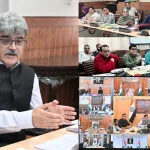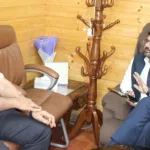RJ UMAR NISAR
Kashmir is staring at yet another flood-like situation. The rising waters of Jhelum are not just a natural event. They are a mirror reflecting our actions, our neglect, and our abuse of nature. Floods today are no longer on ly about rain and snowmelt… they are about the waste we dump into our rivers, the wetlands we have shrunk, and the small water bodies we have destroyed that once absorbed the threats of rising waters.
I have had the privilege of working with UNICEF India on climate change initiatives, and one truth I learned there is that climate change is nothing less than a pandemic. Unlike a virus, though, this one does not spread in silence… it spreads through our actions, our consumption patterns, our lifestyle choices. And it can only be treated by human effort and responsibility.
In this fight, Mission LiFE (Lifestyle for Environment), launched by Prime Minister Narendra Modi, is a groundbreaking step. I had the honor of officially promoting Mission LiFE with UNICEF and the Ministry of Health and Family Welfare, where I saw firsthand how sustainable living can move from being just a slogan to a real movement. It calls on all of us to live mindfully, to make responsible choices, and to build a culture where protecting the environment is not an option, but a way of life.
I was reminded of this recently in a candid conversation with respected JL Raina Sir, a Kashmiri Pandit and an experienced teacher at Birla Open Minds International School, Pampore. With deep knowledge of our heritage, he told me how our ancestors once respected water bodies not just physically but spiritually. They saw rivers, streams, and lakes as sacred lifelines. And then he said something powerful “We abused nature by pouring even washroom and toilet waste into our water bodies. Now, floods are carrying that same waste back into our homes and kitchens… reminding us to respect what we destroyed.” His words still echo in my mind.
I have seen the difference collective action can make. In Tral, we organized a cleanliness drive at Panir Dam, which had been neglected and buried under waste. Together with committed citizens, we removed garbage, revived its beauty, and sent out a message: when we respect nature, it respects us back. That small effort became proof that change is possible… if we act.
But today, as Jhelum swells, we face a far greater test. The truth is simple: we are paying the price for our negligence. Our wetlands that once absorbed excess water are gone. Our small streams that once carried life are clogged with plastic. Our rivers, once lifelines, are now landfills. Nature is not punishing us… it is only showing us the outcome of what we have done.
The way forward is not in blame, but in collective responsibility. Each one of us must change how we live, consume, and treat the environment. If climate change is a pandemic, then sustainability is the cure… and every Kashmiri, every citizen, has a role to play.
The rising Jhelum is not just water… it is a warning. Ignore it, and tomorrow’s disaster will be far harsher. Act on it, and we still have a chance to save not just our rivers, but our future.
(Author is three time UNICEF Awardee Podcaster and TEDx Speaker and is recognized for impactful social change content)






